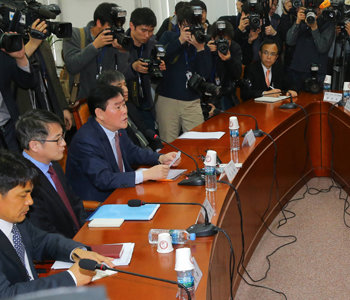Govt, ruling party show the white flag due to public backlash
Govt, ruling party show the white flag due to public backlash
Posted January. 22, 2015 06:57,

The government and the ruling Saenuri Party have eventually given in to taxpayers who expressed strong complaints about year-end tax filing. They eventually released measures to cut taxes by increasing tax deduction benefits. They also announced an unprecedented measure that they would retroactively apply tax deductions on the income earned in 2014 by changing the tax code in the National Assembly in April.
The new measures are expected to reduce the burden of some households with multiple children or single households, which have less tax refund, or have to pay additional taxes in the year-end tax filing. However, the government and the ruling party would likely be under fire for causing confusion in tax policy by releasing stop-gap measures, which is to increase tax credits, to avoid public outcry.
Finance Minister Choi Kyung-hwan and ruling party floor leader Lee Wan-gu had a government-ruling party session and released follow-up measures that would increase tax reduction benefits on Wednesday. "The tax refund resulting from retroactive application will be made possible in around May," said Joo Ho-young, the ruling partys chief policymaker.
The government and the ruling party have decided to relieve the tax burden of households, which experience an increase in taxes due to the abolition of additional tax credits for multiple children, and increase tax reductions for children. Currently, the government cuts taxes of 150,000 won (138.31 U.S. dollars) per child and provides tax reduction of 200,000 won (184.42 dollars) for the third child and onwards to households with more than three children. Childbirth and adoption tax reduction, which offered a tax reduction of two million won (1,844 dollars) per childbirth or adoption, was maintained until last year.
The standard tax deduction of 120,000 won (110.6 dollars) for single households will be raised given small benefits from the current income tax. The tax code will also be revised to increase the tax deduction rate for pension insurance premiums, which is now 12 percent of premiums. In addition, taxpayers will be allowed to pay taxes in installments in case additional taxes are imposed after an year-end tax filing.
In the face of the controversy over this year-end tax adjustment, the government and the ruling party have come up with follow-up measures including retroactive application for fear of costing a momentum in government affairs. However, they will face another criticism that they undermined the stability of finance and law by changing the tax system inconsistently at a time when welfare expenditures are increasing and the government has a serious tax revenue shortfall. The government has to find different sources of taxes.







